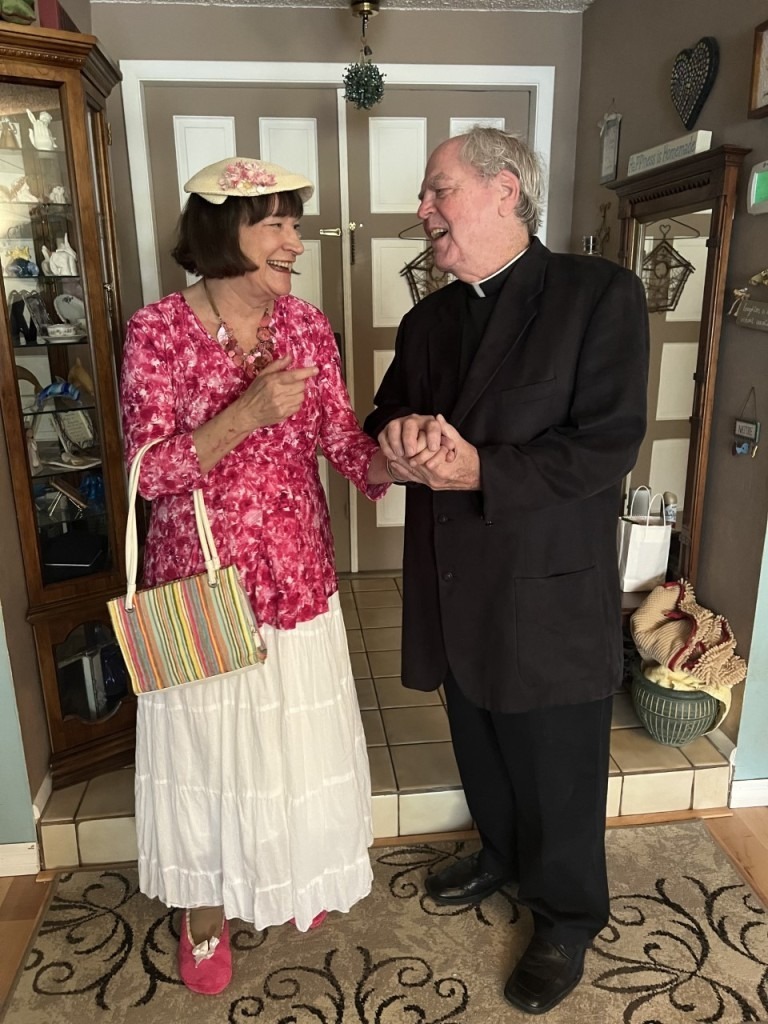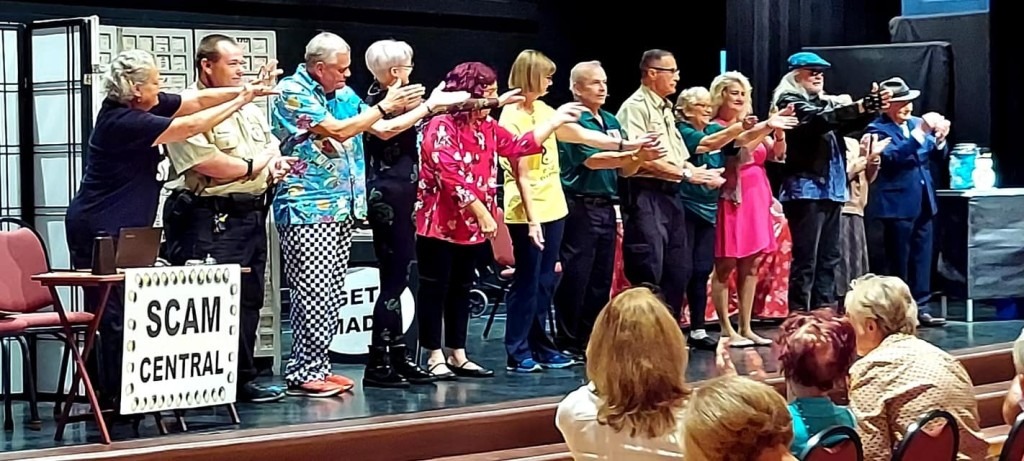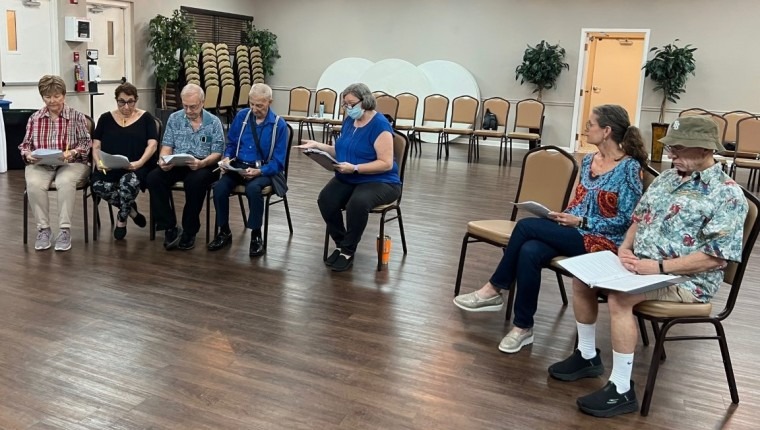Shares "Memory Lane"
May 15 at 2 pm, Seminole
May 27 at 2 pm, Odessa
May 28 at 2 pm, Tampa
Free
Details here
Loved ones living with Alzheimer’s and dementia add extra layers of difficulties for caregivers. It gets confusing and lonely for aging parents living with it – and their children caring for them.
Linda Goldman, founder of Senior Actors Guild & Education Services, the Pinellas nonprofit known as SAGES – Plays with Purpose, recently finished writing the play Memory Lane and felt like no one understood what she experienced emotionally and physically as she took care of her mother who lived with dementia. Goldman says her mother had multiple strokes prior to that.
“I wasn’t aware that strokes could cause vascular dementia,” Goldman says. “If her doctor had informed me, I might have taken those incidents more seriously. He seemed unworried and just added to her medications.”
Goldman took care of her mom for 10 years, who was in her 80s. It eventually got too overwhelming for Goldman and she decided to place her mom in an assisted living facility.
“She was ‘written off’ by her doctor,” Goldman says.
This inspired Goldman to write Memory Lane, a play that gives a voice to caregivers. It reveals the dynamics within families having a member who exhibits dementia.

The families in her play experience struggles — some successes — and moments of joy as they journey down memory lane. The actors bring the hardships caregivers and families experience to the stage.
According to caregiver statistics provided by The National Alliance of Caregiving (NAC), “Family caregivers now encompass more than one in five Americans – 43.5 million (2015) and 53 million (2020).”
NCA Caregiver Statistics, 2020
- More US residents are caring for someone with Alzheimer’s disease or dementia – a 4% increase in caregivers from 22% (2015) to 26% (2020)
- 45% have had at least one financial impact
- 61% work outside of taking care of family members
- More US residents are caring for more than one person, from 18% (2015) to 24% (2020)
Christine Hamacher, artistic and executive director of SAGES, has similar personal experiences to what Goldman experienced and what the characters in Memory Lane face.
“I am currently caring for my 88-year-old mother who developed memory loss with multiple UTIs (Urinary Tract Infections) a couple of years ago,” Hamacher says. “My mother is an extremely smart, thoughtful, creative and resourceful individual. She has an independent streak a mile long.”
Being on this journey with her mom’s memory loss is excruciating and enlightening every day for Hamacher. She is keenly aware that while she has no power over what is happening in her mother’s brain, the confusion and lack of control her mom feels can be debilitating.
In some scenes from Memory Lane, she feels like she is watching her current life onstage. This play’s message is for caregivers telling them they are not alone.
“I am thankful for all the resources that we refer to in this play,” Hamacher says.
Her mom, whom she refers to as a fiery combo of dementia and a fiercely, independent red-haired Irish-blooded woman, poses challenges because she has an inquisitive brain that wants to understand her frequent memory loss. Just the other day, her mom experienced a UTI and it turned quite chaotic for Hamacher and her mom.
It is common for dementia patients to frequently develop UTIs. “UTIs can cause sudden confusion (also known as delirium) in older people and people with dementia. If the person has a sudden and unexplained change in their behaviour, such as increased confusion, agitation, or withdrawal, this may be because of a UTI,” according to the Alzheimer’s Society.
Goldman says that Memory Lane reveals much of herself and her caregiver journey. Some characters, Ralph and Mary Martha, who appeared in earlier plays, Phoney Baloney, (helping alert seniors to scams, also written by Goldman) return to the stage in this play as an older married couple. Ralph struggles to take care of Mary Martha, who has memory loss.
Two other characters, Nick and Nora, who also originated in Phoney Baloney, face challenges caring for Nora’s older sister who lives with memory loss.
New characters include – Nikki, a social worker in her 40s. . . Danny, a 55-year-old caregiver to his abusive father. . . Jane, a caregiver who lacks help from her siblings while she takes care of their angry mother. . . Ken, who has placed his partner, Jack, in an assisted-living home. . . and Liz, a lively, cheerful expert who offers support-group meetings for caregivers.

– photo courtesy of SAGES social media
“The unknown is scary for everyone. Those with memory loss cannot be completely responsible for themselves any more. . .
“We (caregivers) need to ask for help and accept it. We need to take care of ourselves so we can continue to be there for our loved ones.
“If you are a caregiver, you are not alone. If you have memory loss, you are not alone. By having the conversation now, we can be more prepared for what could be ahead,” Hamacher says.
Free Performances of Memory Lane
Monday, May 15 at 2 pm
Seminole Gardens’ Peacock Center
8324 112th Street North in Seminole
Saturday, May 27 at 2 pm
Starkey Ranch Theatre Library
12118 Lake Blanche Dr. in Odessa
Sunday, May 28 at 2 pm
Northdale Park Recreation Center
15510 Hooting Owls Place in Tampa
Reservations are highly recommended to ensure you have a seat at this free show. Walk-ins are welcome at 1:45 p.m. for remaining seats. You can make a reservation at sagestheater.org. (The May 13 show at Tarpon Springs Cultural Center is already full.)
A Q&A with local experts is scheduled after every show. SAGES also provides resource tables with goody bags offering education tips about caregiving.
For more information, you can call 727-536-7076 or email playswithpurpose@sagestheater.org



